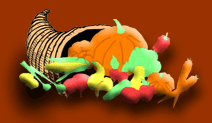Halloween
is one of the oldest holidays with origins going back thousands of years. The holiday we know as Halloween has had many influences
from many cultures over the centuries. From the Roman's Pomona Day, to the Celtic festival of Samhain, to the Christian
holidays of All Saints and All Souls Days.
Hundreds of years ago in what is now Great Britain
and Northern France, lived the Celts. The Celts worshipped nature and had many gods, with the sun god as their favorite. It was "he" who commanded
their work and their rest times, and who made the earth beautiful and the crops grow.
The
Celts celebrated their New Year on November 1st. It was celebrated every year with a festival and marked the end of the "season
of the sun" and the beginning of "the season of darkness and cold."
On
October 31st after the crops were all harvested and stored for the long winter the cooking fires in the homes would be extinguished.
The Druids, the Celtic priests, would meet in the hilltop in the dark oak forest
(oak trees were considered sacred). The Druids would light new fires and offer sacrifices of crops and animals. As they danced
around the the fires, the season of the sun passed and the season of darkness would begin.
When
the morning arrived the Druids would give an ember from their fires to each family who would then take them home to start
new cooking fires. These fires would keep the homes warm and free from evil spirits.
The November
1st festival was called Samhain (pronounced "sow-en"). The festival would last for 3 days. Many people would parade in costumes made from the skins and heads of their animals. This festival would become the
first Halloween.
During
the first century the Romans invaded Britain.
They brought with them many of their festivals and customs. One of these was the festival know as Pomona Day, named for their goddess of fruits and gardens. It was also celebrated around the 1st of November. After hundreds
of years of Roman rule the customs of the Celtic's Samhain festival and the Roman Pomona Day mixed becoming 1 major fall holiday.
The
next influence came with the spread of the new Christian religion throughout Europe and Britain. In the year 835 AD the Roman Catholic Church would make November 1st a
church holiday to honor all the saints. This day was called All Saint's Day, or Hallowmas, or All Hallows. Years later the
Church would make November 2nd a holy day. It was called All Souls Day and was to honor the dead. It was celebrated with big
bonfires, parades, and people dressing up as saints, angels and devils.
But the
spread of Christianity did not make people forget their early customs. On the eve of All Hallows, Oct. 31, people continued
to celebrate the festivals of Samhain and Pomona Day. Over
the years the customs from all these holidays mixed. October 31st became known as All Hallow Even, eventually All Hallow's
Eve, Hallowe'en, and then - Halloween.
The Halloween
we celebrate today includes all of these influences, Pomona Day's apples, nuts, and harvest, the Festival of Samhain's black cats, magic, evil spirits and death,
and the ghosts, skeletons and skulls from All Saint's Day and All Soul's Day.

